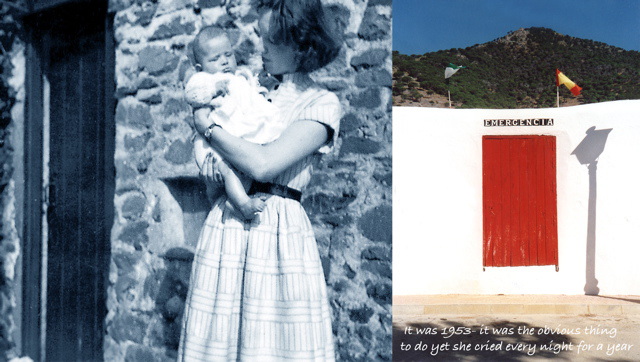Mother
Love |
|||||||
| Mother Love: Ingrid Hesling: 'Smile' - A Family Album | |||||||
| This body of work challenges and
questions the understanding of the family album as innocent, naive snapshots.
The memory and interpretation of an individual’s personal history
is inevitably influenced by the illustrated archive found in most households
- the family photo album. Our ideas about people and events we maybe never
knew or cannot remember are formed through the continual reviewing of
these photographs and the telling of family anecdotes passed down through
older generations. We also revisit our own past, recorded onto sheets
of shiny paper, from birth to present day. With the twentieth century’s
vast legacy of snapshot photographs as ‘evidence’, a sense
of the recent past is more vividly present to us than to any previous
generation. When I was sixteen years old, my grandmother told me I had been adopted at six weeks old. The people I knew as my parents were my uncle (who had since died) and his wife. |
 |
||||||
| In
1953 my mother found she was pregnant by a man who lived abroad and would
not support her. Her brother and his wife were unable to have children
so the family concluded that they should adopt the baby. I was brought
up in a climate of lies. As an adult I recall the stories I was told regarding my babyhood, such as where I was born, how I was breast-fed. None of them was true. I grew up with the family album photographs of my ‘auntie’ who was in reality my mother and conversely, my ‘mummy’ was in truth my aunt. Only as an adult did I hear my birth mother’s perspective on the facts and trauma of surrendering her child.In our albums were also photos from my adoptive mother’s past, her first marriage, the loss of both her first husband and her young son during the war in Nazi Austria. The Second World War ended just seven years before I was born and the impact of those war years still had a strong influence within the culture and environment of my British childhood. In spite of becoming a British subject and marrying an English liberal, my maternal role model came from a fascist background. At times I felt spilt between two opposing cultures; in some respects I was ‘living with the enemy’. These images deal with personal events, yet they also confront universal issues such as birth, death, illegitimacy, single parenthood and parental roles. The right of the child to know the identity of its parents is extremely topical in relation to sperm and egg donation.Smile also reviews how society’s mores have changed in the past forty years, investigating the relevance of personal and cultural histories and meshing them together; the personal viewed in a contemporary world context. And yet these photographs were made at a specific time, in a particular place, recording what was in front of the lens - a snapshot.There are no overt simple messages in this piece of work; no one person (or gender) is consistently the ‘villain’ of the story, there is no conclusive happy or sad ending. It may be seen to fit in within the ‘post modernist age’ in which we are said to live, yet this work is undeniably rooted in a conventional cultural history and thus throws up issues in a world of ambiguity and inconclusiveness; where political dogmas and doctrines are challenged, thus echoing the human condition. |
|||||||
| See
more of Ingrid’s work at www.ingridhesling.com |
|||||||
website
by Sara Fairfax sarafairfax@hotmail.co.uk |
|||||||